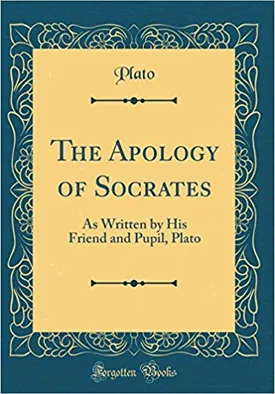The Apology of Socrates: As Written by His Friend and Pupil, Plato by Plato
The Apology of Socrates, as written by his friend and pupil Plato, is an account of the trial of the great philosopher Socrates during the fall of 399 B.C. in Athens, Greece. The Apology recounts the process of this trial, from the time of Socrates’ arrest to the time of his eventual death sentence. Through the dialogue between Socrates and his prosecutor Meletus, Socrates defends himself, using a method known today as the Socratic method. By questioning the foundation of the accusations, Socrates reveals his quest to uncover the truth and his belief in the power of public dialogue. His ultimate goal is to demonstrate his own goodness and awareness of human limitations.
The mistrust of Socrates by Athenian citizens and the government had already grown to the point of paranoia, and his advice to his friends to disobey the state’s rules and refuse to recognize its authority were seen as dangerous. Meletus was particularly scorned by Socrates’ teachings and had made it his mission to discredit him and protect his own reputation. As a result, Meletus charges Socrates with “corrupting the minds of the young and thinking that he’s wiser than everyone else.”
Socrates responds to these accusations by explaining that, in an attempt to answer the questions he’s been asked all his life, he has found nothing to teach but understanding of the truth. He stresses that seeking truth is the only way to learn and that knowledge is not something to be imposed upon someone else. Although Meletus is unwilling to accept this, Socrates continues to explain that he is not personally responsible for the (perceived) corruption of the youth, but rather the state’s. Socrates believes that altering the current system is the only way to prevent the so-called “corruption” of the youth and sees himself as a messenger of justice, trying to improve the conditions of the state.
Not only does Socrates stand as a messenger of justice, but also as an example and shaper of ethics and morality. He believes in the potential for humans to improve upon themselves and attain true knowledge and understanding. As a result, Socrates strives to point out our imperfections, emphasizing on the difference between what is wrong and what is right. Ultimately, his goal is to reveal his true morality and to enhance our recognition of the power of questioning and analyzing the knowledge we have.
The Apology of Socrates is an incredibly powerful and influential piece which helps us better understand the tense social and political climate of Athens at the time. It gives us insight on current events, and examines the cruelty of a flawed justice system while highlighting the courage of an extraordinary philosopher whose devotion to finding the truth was unwavering. The Apology also serves as a reminder of the importance of questioning and re-examining our beliefs, an ideal that today is still relevant and highly valued by many. Socrates’ death is a tragic loss but, thanks to Plato’s commendable efforts, the Apology of Socrates will continue to provide insight and inspiration to future generations.

